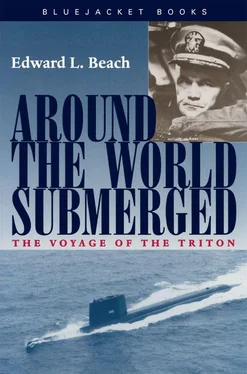As the careful watch over the fathometer continued, our worries increased. The receiver crystals had again burned out, and our new transformer had gone, too. Both were abnormal casualties, and it appeared that the basic trouble was not in the electronic hookup of the fathometer, but in the installation of the fathometer head itself. This, unfortunately, was something with which we could not cope, even were the ship on the surface. We could, and did, take resistance and capacitance readings of various components through the electrical connections inside the ship to which we had access. But so far as inspecting the head, possibly eliminating a leak or replacing a bad component with a good one, we were completely helpless.
By 0200, complete loss of the fathometer was confirmed. Another set of crystals, just replaced in the receiver, had immediately burned out, and there was no question that the fathometer head itself was the cause. Chief Sonarman George McDaniel reported that while he was measuring the resistance to ground he recorded a rapidly reducing resistance to the point where the sonar head was completely grounded out.
All submarines are plagued with inability to maintain topside wiring free of water. A great number of cables must come through the pressure hull and therefore, over some percentage of their length, must be exposed to full sea pressure. Despite great care in installation, there are always some that flood, either through an unsuspected fault in the pressure sealing of the cable itself or because of improper installation. New ships, because of their miles of cabling, always have the greatest difficulty keeping their wiring dry.
Realizing that we would have to complete the rest of our cruise without a fathometer, a serious period of self-analysis faced me. Could we safely finish the trip without danger of running aground on some uncharted shoal or damaging the ship by striking bottom in one of the restricted passages we would later be required to navigate?
It was not as though this had suddenly become a consideration at four o’clock on the morning of the twelfth of March. I had been thinking it over ever since the first difficulty with the fathometer had arisen, and had generated some experiments with our search sonar and Mike Smalet’s “monkey in a cage”—our name for his gravity-metering gadget.
Even before it finally broke down, I had become convinced that despite the loss of the fathometer we could still proceed along our way. Our search sonar reliably detected shallow water ahead and on either side, and particularly gave us immediate warning of sudden changes in the depth of the ocean bottom. Smalet, who was as anxious as anyone that the trip proceed successfully, had advanced the theory that although unexplained anomalies in the earth’s crust had an effect on gravity, it was also true that gravity was fundamentally a function of mass and distance. A perceptible increase in gravity should therefore coincide with a reduction in the depth of the ocean, and vice versa. We had been trying out his theory whenever there was an opportunity, and to our delight found that there was indeed some such correlation.
However, a more subtle question had to be answered: should I report our trouble?
By this time, we had passed into the operational control of ComSubPac, whose headquarters were in Pearl Harbor. What would be his reaction upon receiving a message from the Triton stating that her fathometer was out of commission? What indeed would be the reaction in the Pentagon? It was in a sense my duty to report our problem, but would I not, in so doing, be passing on responsibility I should assume myself? How could any admiral in Pearl Harbor or Washington or New London evaluate the situation as well as I could? Unable to see the situation at first hand, might they not be obliged to adopt the cautious course?
In short, if I simply reported the loss of the fathometer without all the amplifying considerations we had so laboriously developed in the past week and a half, was there not a good chance that we should be ordered to cancel the remainder of our trip and proceed directly to Pearl Harbor for repairs?
This question, with all its nuances, was the big one. In final analysis, I felt continuation of our expedition depended as much upon my decision at this point as on anything we had done to date. Well I knew the Navy tradition; on the Captain rests the responsibility for the right decision. And well I remembered what had happened to Father after the Memphis had gone aground in Santo Domingo harbor. The cause had been a tidal wave—unpredictable, therefore something against which one could not have been prepared. Pacing the deck of his ship on a warm, pleasant afternoon, at anchor with awnings rigged, gangways down, and liberty parties ashore, he had been the first to see danger. Within forty minutes, mast-high breakers swept in from the peaceful sea and Memphis was cast ashore on a coral reef, a total wreck. Father was exonerated of all blame for the catastrophe, except the impossible responsibility for not having anticipated a tidal wave. (Technically, “not having been ready to get underway immediately.”)
This was, in fact, the major contention upon which his court martial eventually turned. In the crux of the decision, which the court, true to Navy tradition, could not but render against him, was the statement that nothing could divest the Commanding Officer of the ultimate responsibility for the safety of his ship. A comparable responsibility now burdened me.
Breakfast was served as I wrestled with the problem. This was not something that anyone else on board the Triton should be concerned with, but the more I thought of it the more certain I became that here, even more surely than off Montevideo, success or failure of our voyage lay in the balance.
Much has been written about the so-called “calculated risk,” but one of the considerations or calculations which cannot be neglected is that if failure is encountered, the penalty is no less severe than if the risk had been assumed without forethought.
All the training the Navy had given me, all the background of the Naval Academy and my years at sea, could lead to only one conclusion. As in Father’s case and in every similar case, the final responsibility is on the Commanding Officer. I had to make the crucial decision, and it had better be the right one.
I resolved not to report our difficulty. Come what might, we would carry on and complete the voyage. Furthermore, I could not permit our situation to be fully appreciated by anyone else aboard. This load, like that of our special mission, could not be shared with anyone.
At 0105 on the morning of March thirteenth, our search sonar made contact with a submerged peak. Without the fathometer or the precision-depth recorder—which received its data from the fathometer—we were unable to determine the minimum depth of water over this peak.
We could not, consequently, predict how much water we had to maneuver in. In accordance with instructions, the Officer of the Deck slowed and changed course to avoid. We did so with ease, passing the shallow area well abeam and continuing on our way. Probably our caution was excessive, but my confidence in our ability to detect and avoid shallow water was confirmed.
At five o’clock in the morning, we brought Triton to periscope depth. Easter Island should be dead ahead.
From the Log:
0512 Radar contact on Easter Island at bearing and range predicted.
As we approached land, to my gratification our search sonar indicated a gradual shoaling of water as we moved steadily toward the island. Because of loss of depth of water information and in deference to the three-mile limit, we had decided to stay well clear of land.
From the Log:
Читать дальше












